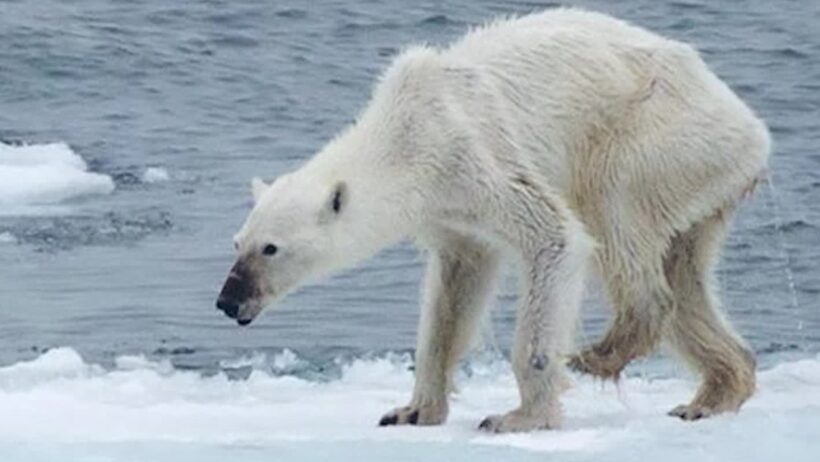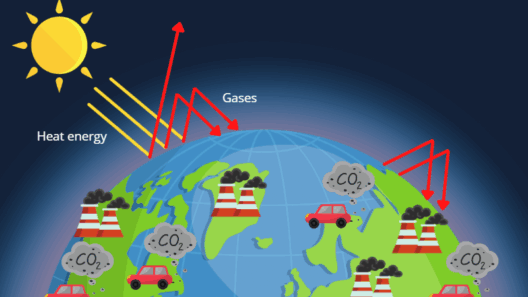Global warming is an omnipresent phenomenon that transcends the plight of polar bears; it fundamentally impacts our daily lives and the very fabric of human existence. While polar bears serve as a symbolic representation of climate change’s dire consequences, the adverse effects of rising global temperatures affect us all, in myriad and insidious ways. Understanding this relationship is crucial for mobilizing action and fostering a collective responsibility towards preserving our planet.
The climate crisis is characterized by an increase in average global temperatures, predominantly attributed to heightened greenhouse gas emissions. The burning of fossil fuels, deforestation, and industrial processes contribute significantly to this accumulation of gases in the atmosphere. This accumulation not only disrupts weather patterns but also precipitates catastrophic events, such as extreme heatwaves, fierce storms, and unprecedented flooding. Each of these events poses immediate threats to human safety and welfare. The impact of climate change extends to food security, health, and economic stability, affecting our everyday lives far more profoundly than one may realize.
The agricultural sector, a cornerstone of human sustenance, feels the strain of climate fluctuations. Altered precipitation patterns have led to droughts in certain regions and flooding in others. These inconsistencies can devastate crop yields, reducing food availability and driving prices skyward. Consequentially, food security is increasingly jeopardized, particularly in developing nations where populations are more vulnerable to such fluctuations. The delicate balance of ecosystems that produce our food is being disrupted, raising the specter of famine and malnutrition for millions.
Health implications stemming from climate change are equally alarming. Rising temperatures foster conditions conducive to the proliferation of infectious diseases. Warmer climates allow pathogens and vectors such as mosquitoes to thrive in regions where they were previously absent. Malaria and dengue fever, for instance, may become endemic in areas traditionally unburdened by these ailments. Additionally, heat-related illnesses, respiratory disorders linked to poor air quality, and mental health challenges arising from climate anxiety are becoming increasingly prevalent. As temperatures rise, so too does the risk of extreme weather events, which can cause injury and exacerbate existing health issues.
Furthermore, global warming significantly affects socioeconomic structures. Vulnerable populations—especially those in low-income communities—face the brunt of the crisis. Limited resources hinder their capacity to adapt to changing climates, exacerbate existing inequalities, and may incite social unrest. As natural disasters become frequent and severe, the cost of recovery can overwhelm local economies, leading to long-term damage that reverberates through generations. The migrant crisis spurred by climate-related disruptions continues to strain national infrastructures and exacerbate geopolitical tensions. It’s a complex web that connects individuals far removed from one another, underscoring that local actions can lead to global repercussions.
The economic ramifications are profound and multifaceted. The cost of inaction can dwarf the anticipated expenditures required for transitioning to green technologies and renewable energy sources. Investment in sustainable practices not only mitigates the threat of climate change but can yield job creation and innovation in burgeoning sectors. By fostering industries centered on clean energy production, energy efficiency, and sustainable transportation, economies can flourish while simultaneously addressing the environmental crisis. The rationale for transitioning to sustainability extends beyond altruism; it is a pragmatic approach that equates environmental preservation with economic vitality.
Individual actions, though often perceived as trivial in the face of such a colossal issue, can collectively catalyze significant change. Simple lifestyle modifications—such as reducing energy consumption, minimizing waste, and supporting sustainable products—contribute to a wider cultural shift towards sustainability. Choosing public transport, purchasing locally sourced goods, and advocating for policy changes are ways everyday citizens can engage in climate action. The power lies in the collective; when individuals unite under a shared vision of sustainability, the impact is magnified exponentially.
Moreover, public policy plays a critical role in combating global warming. Governments must implement regulations targeting emissions reductions, incentivizing renewable energy, and promoting conservation efforts. This systemic approach not only provides a framework for accountability but also fosters collaboration among various stakeholders, including businesses, communities, and long-term visionaries. It is imperative that elected officials prioritize environmental sustainability to ensure a habitable planet for future generations. Engaging in dialogue with policymakers and holding them accountable for their commitments can drive progress and advocacy.
Education is paramount in fostering a culture of awareness and responsiveness to climate change. Initiatives aimed at informing communities about the implications of global warming and the significance of sustainable practices can inspire action from the ground up. Schools, universities, and local organizations need to collaborate on projects that empower individuals with knowledge and resources, cultivating a generation keenly attuned to environmental stewardship.
In conclusion, the narrative surrounding global warming extends well beyond the plight of polar bears. It encapsulates the myriad ways our collective futures are intertwined with the health of our planet. Every choice we make, from our consumption patterns to our voting behavior, reverberates through our ecosystems and societies. It is imperative that we recognize the urgency of the situation and act decisively. Climate change is not an abstract concept confined to distant glaciers or far-flung rainforests; it is a pressing reality that demands our immediate attention, for it is about you, about me, and about the legacy we leave for generations yet unborn.








